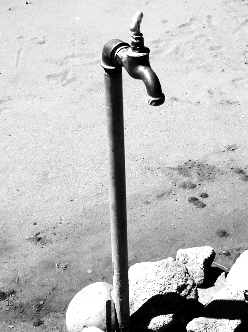Long quest for Alice case
 Traditional owners have travelled hundreds of kilometres to Alice Springs for a court date years in the making.
Traditional owners have travelled hundreds of kilometres to Alice Springs for a court date years in the making.
Court action was launched after the right to extract 40,000 megalitres of groundwater from Singleton Station, on desert country north of Alice Springs, was granted to horticultural venture Fortune Agribusiness in 2019.
The Northern Territory does not charge for large-scale commercial water use, so the company will be allowed to extract the water for free.
Experts say the licence would have cost up to $300 million in other jurisdictions. The project’s own estimations say that over its staged 30-year life span, the project will extract more than 1 trillion litres of water from red dirt Kaytetye country, and could destroy up to 30 per cent of the region's groundwater-dependent ecosystems.
This includes groundwater dependent ecosystems that are also sacred sites. Their potential destruction is driving traditional owners' opposition to the licence.
At this week’s hearing, traditional owners will argue that Territory Families Minister Kate Worden failed to “properly” or “rationally” consider 1,600 pages of technical evidence, or consider Aboriginal cultural values in granting the licence.
Documents lodged in court show Ms Worden gained the power to award the licence on a Thursday and re-granted the licence the following Monday. She was delegated the powers by the Environment Minister because of a conflict of interest
“Given the short time between delegation and decision, and the volume and technical nature of the materials, it may be inferred the Minister cannot have properly considered [key evidence],” lawyers for the Mpwerempwer Aboriginal Corporation said in the originating motion before the court.
“The Minister's decision to grant the licence was seriously irrational as no rational minister would have treated the [evidence] so irrationally.”
Fortune Agribusiness claims it has followed every process required of it by the NT Government, and has pledged to work closely with traditional owners on a project it says will bring jobs to the poverty-stricken region.
Ms Worden says she read the review and other submissions before awarding the licence.
A similar case brought by the Arid Land Environment Centre (ALEC) will be held in conjunction at a three-day hearing in Alice Springs.
Lawyers acting for ALEC allege the Minister for Environment's initial decision to issue the licence was “legally unreasonable” because it was not in line with the Water Act.
They allege the licence was not assessed against the relevant water allocation plan, but was granted according to a separate set of guidelines that allowed for more environmental damage.
“No reasonable decision maker could be satisfied that the Proposed Decision was in accordance with the [Water allocation plan],” documents lodged in the ALEC case allege.
ALEC policy officer Alex Vaughan says he would like to see the Territory's water licensing scheme and Water Act come under greater scrutiny.







 Print
Print